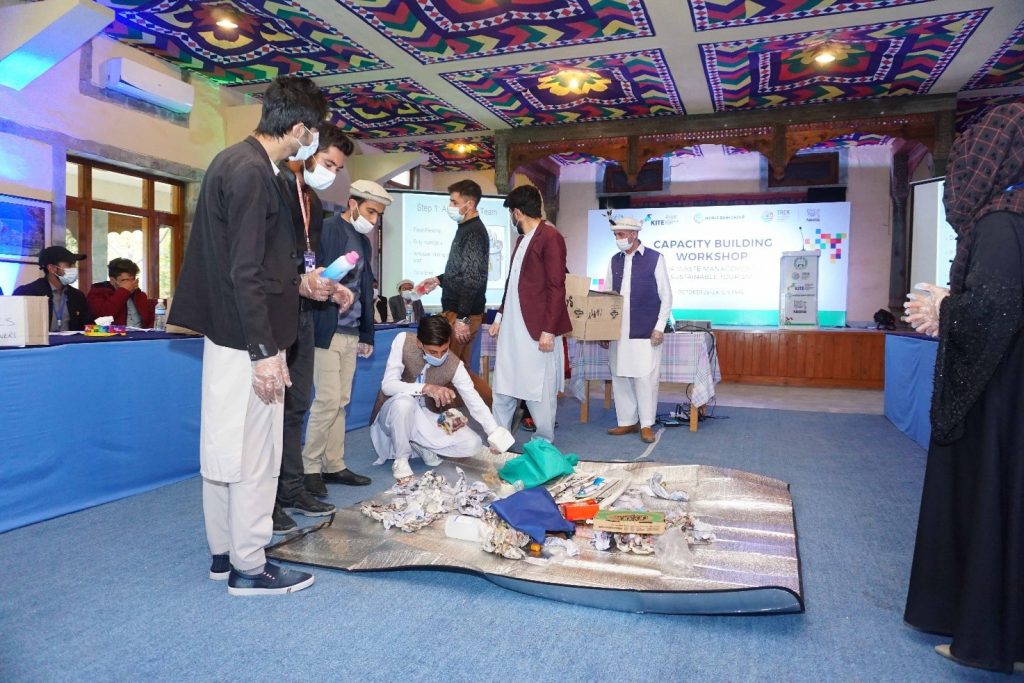As part of solid waste management (SWM) initiatives under TREK (Travel Responsibly for Experiencing Ecotourism in Khyber Pakhtunkhwa), a two-day training was conducted in Chitral by Nestlé Pakistan, in partnership with Government of Khyber Pakhtunkhwa and the World Bank.
TREK was unveiled in December 2020 by Prime Minister Imran Khan, as part of World Bank financed Khyber Pakhtunkhwa Integrated Tourism Development (KITE) project. TREK was also listed as one of federal government’s key achievements of 2020.
In June 2021, TREK communication campaign was launched in Nathiagali to promote responsible tourism in the Galiyat region. On the launch, 2,000 reusable bags were handed out to Galiyat Development Authority (GDA) for local tourists and hotel association. Radio and social media campaigns have been launched; furthermore, signboards emphasizing the importance of clean Galiyat were also installed across the region.
A two-day training titled “TREK for Healthier Kids” was held in collaboration with the Nestlé for Healthier Kids (N4HK) program in August 2021. It concluded with a certificate distribution ceremony for teachers, distribution of 4,000 reusable bags and 2,300 N4HK books to children in Galiyat. N4HK is one of Nestlé’s global Creating Shared Value initiatives that empowers parents, caregivers and educators to foster healthier eating, drinking and lifestyle habits among school age children.
An extensive two-day training on waste management and sustainable tourism in Swat as part of TREK’s community engagement initiatives. The training comprised of sessions on categorizing waste, importance of recycling, learning to conduct waste audits, basic food safety and importance of WASH compliance among others. The event concluded with souvenir distribution for participants by Ghulam Saeed, Director General Directorate of Tourist Services and Touseef Khalid, Project Director KITE. We have also donated 2,000 reusable bags among communities in Swat.
Under the TREK initiative, more than 130 public and private sector participants including 20 women have been trained at the three locations of Swat, Galyat and Chitral. The initiative has also engaged the local communities through training and awareness session on nutrition and hygiene for school children of Galyat.
“We are delighted that community engagement activities such as waste management training and awareness campaigns for tourists are coming to fruition, as part of TREK,” said Tashfeen Haider, Additional Secretary, Tourism Department, KP government, adding that Department of Tourism through KITE project is working on SWM cycle by providing equipment to area development authorities of Galyat, Kaghan, Chitral, Kalam and Kumrat. Moreover, contract for feasibility study and engineering design of sanitary landfill sites have been awarded through the KITE project.

Kiran Afzal, Senior Private Sector Specialist, of the World Bank shared, “KITE project is now implementing activities for tourist facilitation in Chitral which will be complemented by TREK’s initiatives for SWM.”

Talking about the initiative, Waqar Ahmad, Head of Corporate Affairs & Sustainability, Nestlé in Pakistan & Afghanistan said, “Our partnership with the government on TREK, will help realise our vision for shaping a waste-free future, by driving new behaviour for a cleaner environment.”
“At Nestlé, our vision is that none of our packaging, including plastics, ends up in landfill or rivers. To achieve this, we have set ourselves the commitment of ensuring 100% of our packaging is reusable or recyclable by 2025,” he added.
The two-day SWM training comprised of sessions on categorizing waste, importance of recycling, learning to conduct waste audits, basic food safety and importance of WASH compliance among others. The event concluded with souvenir distribution for participants by Ghulam Saeed, Director General Directorate of Tourist Services, Hassan Abid, Deputy Commissioner Chitral, and Touseef Khalid Project Director KITE.

Nestlé Pakistan’s commitment to TREK includes 2 pillars: A massive awareness
campaign focusing on Reduce, Reuse and Recycle and a Community Engagement plan which includes activities that will help in countering the issues of waste, pollution and destruction of wildlife, in line with United Nations Sustainable Development Goals 12, 13, 15 and 17.







